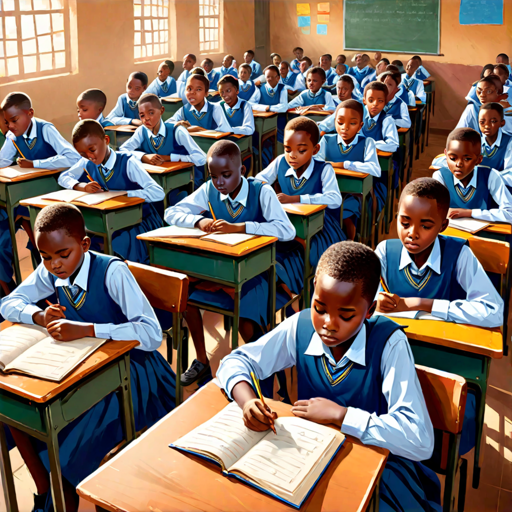Dear Beamers,
Greetings! Let’s examine the logical progression – a continuous transition from yesterday to today and into tomorrow. This mechanism, akin to a copy-and-paste process, has unfolded for ages, shaping years, decades, and centuries. Ideally, it should be an occasion for reflection, strategic planning, growth, and advancement, atleast as observed in developed nations.
In our dear nation, a disheartening downturn in growth is evident across various sectors. In our dedication to providing thorough insights and updates, we present an issue concerning the persistent poor infrastructure development in the educational sector of Nigeria over the years.
Infrastructure, encompassing structures, facilities, and systems, plays a pivotal role in a nation’s economic development. Serving as a catalyst for poverty alleviation, it facilitates access to essential services like healthcare, education, and employment opportunities. Ineffective infrastructure can disrupt production chains, impeding development and resulting in economic deficits, ultimately lowering the standard of living.
At the foundational level of education in certain Nigerian villages and rural areas, basic infrastructure is in a state of complete decay. In various regions, essential facilities such as classrooms, laboratories, workshops, sporting amenities, equipment, and libraries are not only absent but even the few present are deteriorating.
Baruwa Abdullah believes that the prevalent issue of inadequate academic infrastructures at the elementary level, jeopardises the present and future prospects of children. In his words,
“Isn’t it distressing to hear about the situation where children, in the early stages of their education, recite nursery rhymes under trees due to lack of infrastructure? The unpredictable weather leaves them vulnerable to harsh sun and cold, making it difficult to focus. The absence of basic necessities like sports facilities, proper toilets, clean water, and security. Their current conditions are far from what any child should experience, and it’s indeed a lamentable situation.”

The escalating frequency of attacks on schools, particularly in the last decade, raises significant concerns among stakeholders. Establishing infrastructures to enhance the security of children at schools has become imperative. Inadequate infrastructures in both primary and secondary institutions contribute to the gradual traumatization of young talents.
The substandard state of infrastructures results from several factors, such as inadequate funding, resource shortages, inefficiencies in developmental labor, and insufficient attention to repair and maintenance processes.
Numerous communities in Nigeria endure the plight of dilapidated classrooms, and other compromised school structures. Over time, these infrastructure challenges not only impact academic performance but also encroach upon the fundamental rights to education, safety, and health for both learners and teachers.
The repercussions of inadequate school infrastructure manifest in heightened dropout rates among learners and diminished teacher retention rates. The diminishing enthusiasm for education is evident as students are either instructed by well-qualified yet demotivated teachers due to inadequate pay, or inexperienced teachers who perceive teaching as an escape from destitution.
Stakeholders attribute the sharp decline in public school enrollment and students’ poor performance in external examinations to both a shortage of teachers and infrastructural decay.
To tackle the educational inadequacies at institutional level,, the Academic Staff Union of Universities (ASUU), Academic Staff Union of Polytechnics (ASUP), and Colleges of Education Academic Staff Union (COEASU) engage in persistent disputes with the government, revolving around several issues including infrastructural development. Their discontent often stems from unfulfilled agreements with the government, leading to a state of dissatisfaction and discord.
The recurrent ASUU strike has become a persistent issue in the academic calendar, reflecting a struggle to reinstate the dignity of the educational system and attain parity in quality and academic excellence with global universities. The substantial challenge of poor infrastructure looms large over tertiary education in Nigeria, with the decay reaching monumental proportions, posing a significant threat to the existence of these institutions.
Eniola Babatola, a Nigerian university graduate, expresses the belief that the state of infrastructure in several tertiary institutions is deplorable and beyond belief. As articulated in her own words,
“The truth is that numerous laboratories and workshops are in a deplorable state—outdated, overcrowded, and lacking essential equipment. Kerosene stoves substituting for Bunsen burners and the absence of necessary reagents and tools underscore the severity of the problem. The core issue centers around allocated funds, supposedly deposited for infrastructure improvements.”
She continued “The pressing question remains: What has become of these substantial funds, and why haven’t tangible enhancements materialized in the learning environment? The reality demands urgent attention and accountability.”
Instances like these should be inconceivable for a nation acclaimed as the giant of Africa. The essence of our stature diminishes if education, a fundamental component, is neglected. It raises the question of what others look up to us for.
Scores of universities in Nigeria lack public address systems in lecture rooms or theatres. Some have partially automated libraries, while others are burdened with outdated books in non-automated libraries. The integration of technology for teaching is inadequate, with minimal use of interactive boards and video conferencing facilities.

The challenge of providing adequate hostel accommodation for the growing student population in residential universities is becoming increasingly difficult for Nigerian institutions. Despite a surge in student numbers over the years, there has been a notable lack of corresponding improvement in accommodation and other essential student services.
Hostel facilities experience rapid deterioration, leading to issues such as overcrowding, undue congestion in rooms, over-stretched lavatory and laundry facilities, and poor sanitation. These challenging conditions, along with the overall state of universities, contribute to the development of graduates who may lack confidence.
Engineer Yinka Dada, a parent with children at a JAMB registration center in Ijanikin, reflects on his past experiences as a student in a Nigerian public university.
“If I had the means, I’d prioritize sending my children abroad or to a private university for their education. Reflecting on my own university experience, I’m genuinely concerned about the insufficient basic facilities like water, electricity, and transportation.”

The overwhelming situation demands urgent attention from the Nigerian government, especially considering education being a prominent aspect of their campaign manifesto. Despite the rhetoric that children are the leaders of tomorrow, the current state of deteriorating infrastructure and declining interest in schools, in a rapidly evolving technological world, raises concerns about how secure the future truly is.
The pervasive issue of poor infrastructure in our education system cannot be overlooked, and addressing it is imperative. National investment in infrastructure development is crucial to resolving the challenges affecting education. Adequate funds should be allocated for upgrading aging, inadequate, unsafe, and subpar school infrastructure, particularly in previously disadvantaged communities.
Education should be a focal point of concern for influential citizens in our nation, as amplifying the voices of our struggling students has become crucial. In doing so, they contribute not only to the betterment of individual lives but also to the sustainable growth and prosperity of our nation as a whole.




